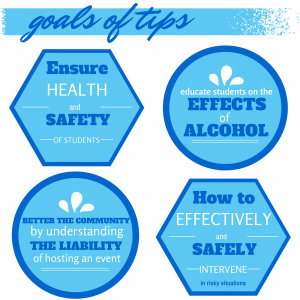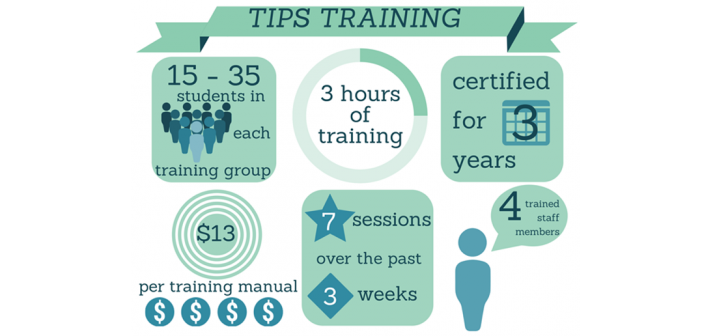Lehigh University’s Office of Fraternity and Sorority Affairs has implemented TIPS Training for off-campus, Greek-affiliated students to provide education regarding potential alcohol-related problems and develop an understanding of the school’s alcohol policies.
According to the TIPS training website, the training is “the global leader in education and training for the responsible service, sale, and consumption of alcohol. Proven effective by third-party studies, TIPS is a skills-based training program that is designed to prevent intoxication, underage drinking and drunk driving.”
Tim Wilkinson, senior assistant dean of students and director of Fraternity and Sorority Affairs, played a large role in bringing the training to Lehigh.
“I’m ultimately the one who said, ‘let’s do this,’” Wilkinson said. “TIPS is one of the most prominent, nationally known alcohol education programs, which is why we’re using it.”
Wilkinson highlighted the three points that the training intends to touch upon: helping students better understand the physiology behind alcohol, social liability and bystander intervention.
“We know fraternities and sororities historically (have) incorporated alcohol as a part of the experience, and we want students to understand the health and safety involved and want them to run their events better,” said Jennifer Tedeschi, assistant director of Fraternity and Sorority Affairs and TIPS trainer, in an email.
Tedeschi further elaborated on Wilkinson’s three main goals of the training. She said the goals of the training are “to ensure the health and safety of our students, to better the community by understanding the liability of hosting an event and to educate students on the effects of alcohol and how to effectively and safely intervene in risky situations.”
 The training groups have been as small as 15 and cap at about 35, which allows for interactivity during the training. Wilkinson said the training involves a lot of students discussing and debating scenarios with one another, which differs from the online nature of AlcoholEdu, an alcohol education program first-year students are required to complete.
The training groups have been as small as 15 and cap at about 35, which allows for interactivity during the training. Wilkinson said the training involves a lot of students discussing and debating scenarios with one another, which differs from the online nature of AlcoholEdu, an alcohol education program first-year students are required to complete.
“Specifically for this semester, we’ve started with our upperclass, off-campus students, because right now we know that’s where most of our social events happen,” Wilkinson said. “We want to make sure they understand their liability.”
Seven training training sessions have been held so far, with mostly three to four a week for the past three weeks, held on campus in various buildings. The OFSA is currently working with the community on appropriate incentives and sanctions for required students who do not complete the training. Some chapters have chosen to conduct separate trainings led by an outside trainer who also works with fraternities and sororities.
“Right now, the seniors have the most liability, which is why it’s so important that we get them (trained),” Wilkinson said.
The training takes three hours, and once students pass the exam, they are certified for three years. Lehigh currently only has four trained staff members: Jennifer Tedeschi, Ashley Baudouin, Pete Costa and Wilkinson. A goal for the future is to host a training for staff and alumni advisers to have more people able to train students.
“I would love to have double-digit trainers so we can be training more students and different student populations,” Wilkinson said.
The TIPS training was originally going to start last semester, but when the Fraternity Management Association shut down last March, money became an issue. The cost is $13 per training manual, so it was decided that the training be postponed until this fall.
“I’m sure there are students who will say it’s good, (and) I’m sure there are students who will say it’s not good,” Wilkinson said.
Nevin Sackson, ’14, a fifth-year student and warden of Phi Delta Theta, participated in the TIPS training. He said the training reminded him a lot of the AlcoholEdu program he completed in his first year.
“It was stuff that we’ve been told a million times,” Sackson said. “I could see the value from the school’s (perspective), but it just felt repetitive.”
Sackson, 22, has a job along with taking classes.
“I had a full day of work, so going from having serious thoughts to an alcohol education course made me feel like I was taking a step back,” Sackson said.
Greg Potter, ’16, social chair of Phi Delta Theta and a participant in TIPS training, also commented on the appropriateness of the training’s target audience. He mentioned that a student questioned whether the program might be better suited for first-year students.
“It’s an interesting idea of trying to teach people who would control the situation versus teaching people to watch out for themselves, which I know is more of the concept of AlcoholEdu,” he said.
Potter noted there are several versions of the TIPS training and suggested that it might have made more sense to use another version of the TIPS training instead of the collegiate one, as much of the material seemed to be repetitive to previous educational experiences.
“I don’t think I walked away knowing anything else; a lot of it was common sense stuff,” Potter said.






Comment policy
Comments posted to The Brown and White website are reviewed by a moderator before being approved. Incendiary speech or harassing language, including comments targeted at individuals, may be deemed unacceptable and not published. Spam and other soliciting will also be declined.
The Brown and White also reserves the right to not publish entirely anonymous comments.